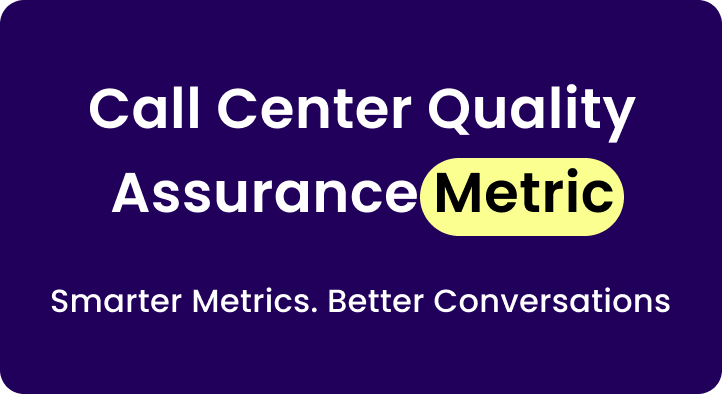It was the third time this month a long-time customer was left on hold for over 20 minutes while trying to resolve a billing issue.
Frustrated, they eventually hung up, feeling ignored and undervalued.
Once loyal to the company, this experience pushed them to switch providers.
Meanwhile, the agent handling the case was feeling the strain of constant pressure, considering quitting due to the overwhelming workload.
Stories like these are common in call centers, where high attrition rates—both for customers and agents—create significant challenges.
Table of Contents
A. What is call center attrition?
Call center attrition is the percentage of agents leaving their jobs. High attrition is a common challenge for call centers due to the demanding nature of the work, including long hours, high stress, and repetitive tasks.
To calculate employee attrition, you need to divide the number of employees leaving the firm divided by the average number of employees.
It is important for the company to look out for employee attrition because high attrition rate leads to high costs, decrease productivity and discomfort among other employees.
How to measure call center attrition?
Call center attrition rate is an important KPI and can be measured by calculating the percentage of employees who leave the call center within a specific period of time.
The formula to calculate call center attrition rate is:
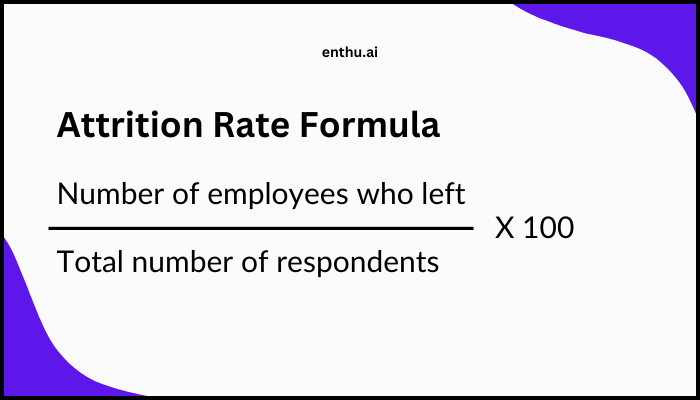
For example, if you have 100 employees at the beginning of the year, and 10 employees leave during the year, the attrition rate would be:
Attrition rate = (10 / 100) x 100 = 10%
This means that 10% of the employees left the call center during the year.
B. 4 Reasons for customer attrition
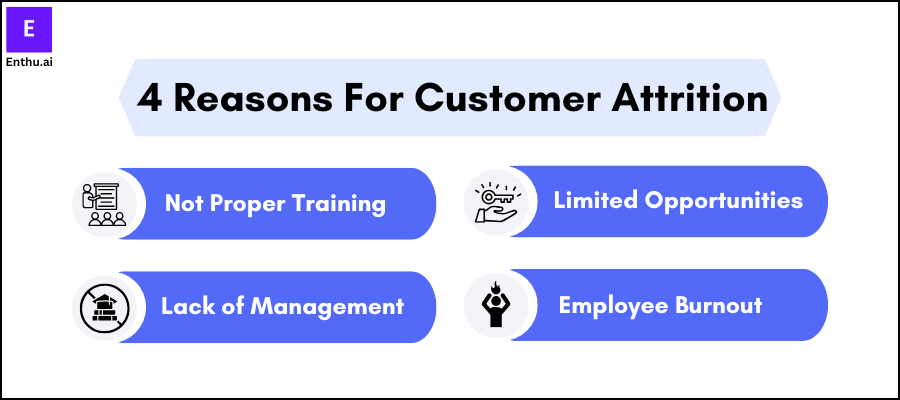
1. Not proper training
The temptation here is to rush new hires through training so you can put them to work.
But this will be a total disaster. You’re about to toss someone into the front lines of customer service without proper training.
It’s a high-stress job that involves dealing with unhappy customers while using unfamiliar applications and technology.
In this kind of environment, new employees will be sinking under the pressure and walking off the job.
Training is also a chance to help the new hire to feel part of the team, which builds an atmosphere of workplace cohesion and collaboration.
So don’t let your training program suffer because you’re in a hurry to park someone in front of a phone.
Set your new hires up for success and give them the time to train, sharpen their skills and improve the main call center KPIs & such as AHT, CSAT, FCR, Statistics, and churn rate.
2. Better management
Better training shouldn’t be reserved strictly as a solution for employees.
Better training can lead to better management.
No one else’s influence will impact call center employees’ performance more than their manager.
And management style is often the main reason given when an employee quits.
Managers need to take time out to evaluate their management style and to find ways to improve it.
They need to curb any detrimental behaviors in themselves, like a lack of respect for employees or ineffective team management.
The most important area of improvement is in a manager’s communication skills. Clear expectations and transparent decisions-making will go a long way in winning an employee’s loyalty.
Pro Tip💡
Speech analytics software helps unlock hidden insights from conversations, driving better agent performance and customer experience.
3. Limited opportunities for advancement
The employees most likely to stick with your call center and make the biggest difference will usually have a common motivator: personal development.
They want to improve their skill set, and they want the opportunity to let those skills shine.
Too often, call centers shed their best workers because those employees feel like they’re stagnating.
So they leave to continue their schooling, or they turn to other employers where they see more opportunity for personal growth.
In many cases, the problem is simple planning and communicating.
Let them know what you’re looking for in these positions, and how those positions could help them advance in their careers.
4. Employee burnout
It happens in call centers—you hear so many complaints, take so much abuse from customers, you get burned out. You can’t take it anymore.
For this situation, we recommend using recognition and rewards to revitalize your team.
Workers can undergo tough conditions if they’re properly motivated, and when they know their efforts are appreciated.
Take time out to recognize high-performing employees. Call your other employees together to share the good news when one of them has beaten past records or hit all his or her goals.
Or if the employee is on the shy side, take that person aside and thank him or her aside in private.
Additionally, set up a reward system of some kind to incentivize efficiency and excellence.
This could include parking spots, extra days off, special privileges—get creative. Go out of your way to surprise your employees and show gratitude for their ongoing efforts.
Use Enthu.AI to measure your agents performance.
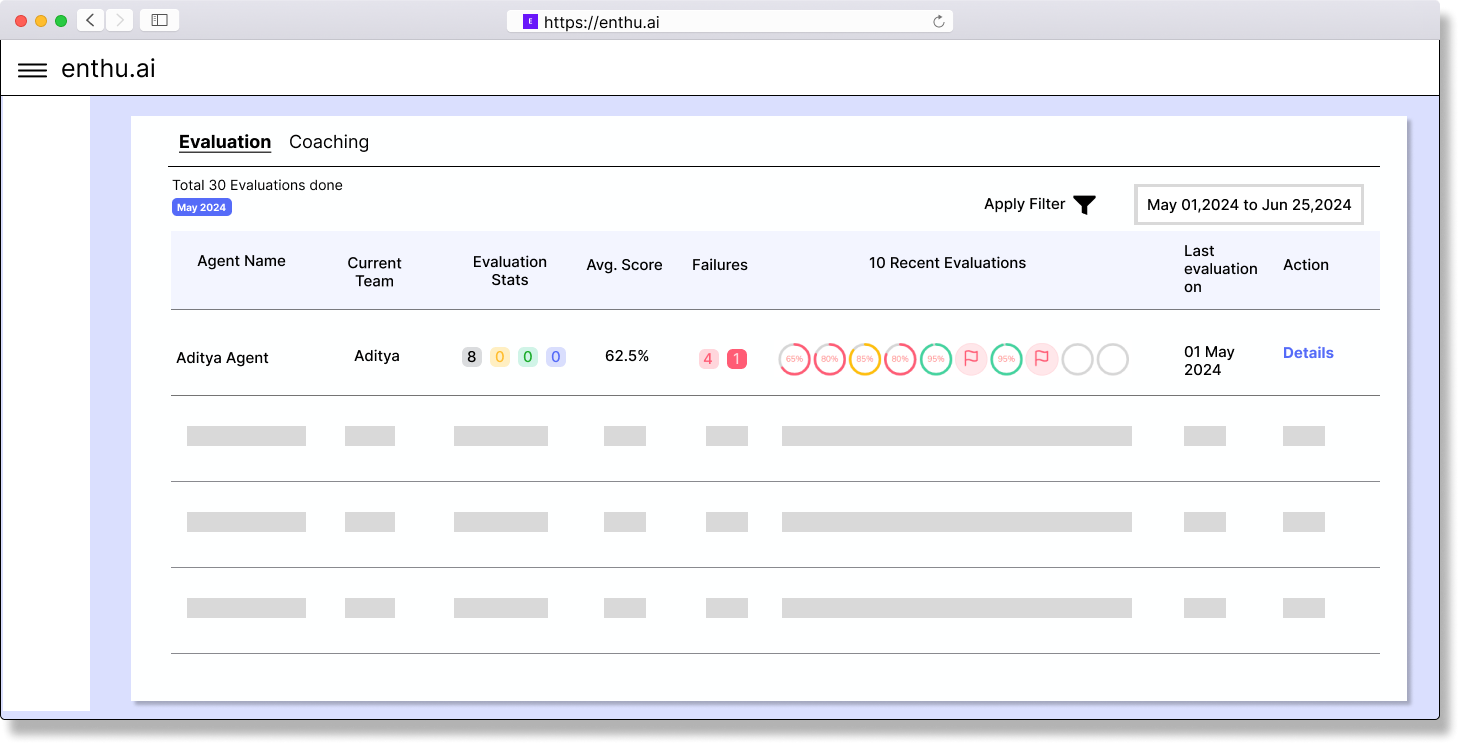
Pro Tip💡
Conversation intelligence software analyzes customer interactions, providing actionable insights to enhance sales and service performance.
C. How to reduce call center attrition?
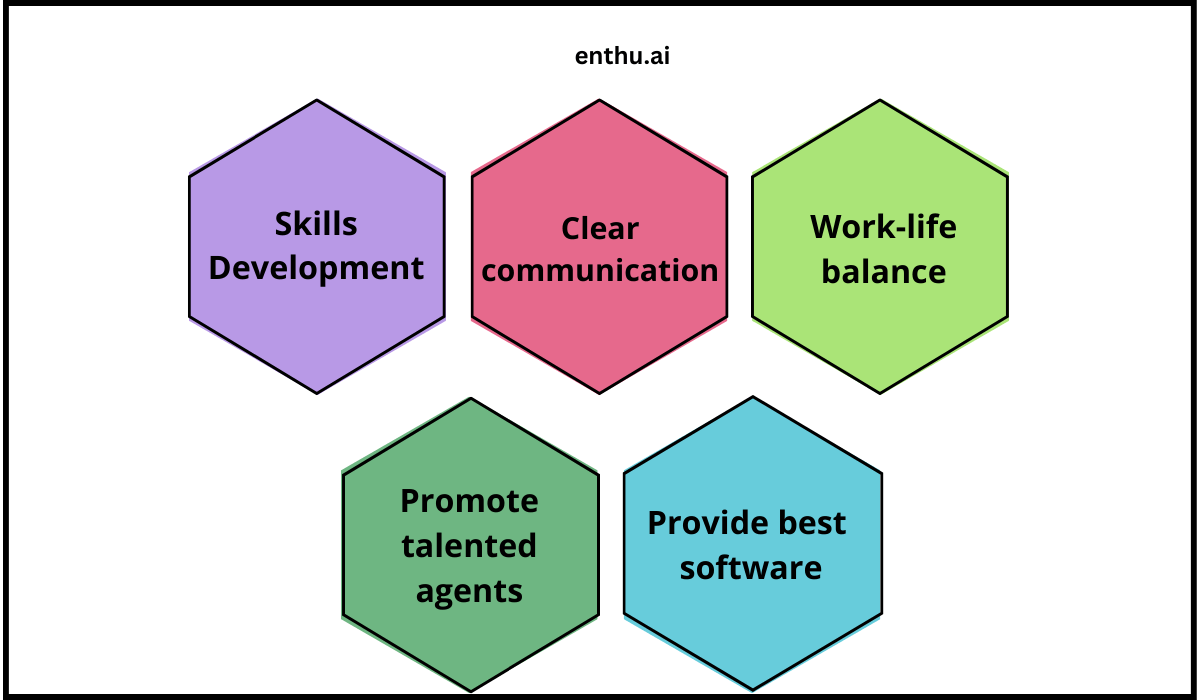
1. Skills development
Companies should aim to develop skills of the employees because personal development is always a great motivator for employees.
Also, helping employees to develop skills is good for the company, the client and the employee.
Employees should be trained on a regular basis to add a new skill to their skill set. As a result, agents feels a sense of achievement and it makes the job interesting.
When you impart new skills, the need for financial reward takes a backseat.
Also, employees stay with company for a longer time and increases efficieny of the firm as well.
2. Clear communication
Call center must clearly define what is expected of agents and based on that expectation, feedback must be given.
Agents must also know who they talk to when they have an issue or concern.
Also, they should be involved in business decisions and informed about any changes in company goals and strategies.
Call center agents can bring in new ideas to the table that can be effective, but only when they feel that they are being heard.
Having a clear communication between agents and management and involving them in major decisions of the firm will make them feel motivated, empowered and invested in your company.
Pro Tip💡
Call center software streamlines operations, enhances agent productivity, and improves customer satisfaction through automation.
3. Work-life balance
An employee is as important as the customer because employee is the one who will be looking after the customer, so it is necessary to look after employees.
Agents too have a life outside the call center, so it is the duty of the firm to help agents to achieve right balance between work and personal life.
Call centers should provide agents with different options such as opportunity to work from home, on a flexible schedule, or work in office with ergonomic workspace.
This will help agents to achieve right work-life balance and they will be more satisfied with the work.
As a result, they will be willing to come back to work with full enthusiasm.
4. Promote talented agents
Many positions in call centers needs to be filled with internal candidates.
It is essential because it makes agents understand that if they work hard they have the opportunity to grow and progress.
It makes agents more effective and efficient and they would stick to the company for a long time.
And when an employee is promoted, it makes other employees work harder and be more efficient with their work in order to get promoted.
Pro tip💡
Call center quality monitoring software automates evaluations, ensuring consistent performance, compliance, and superior customer service.
5. Provide best tools and software
Call centers should provide agents with right set of tools and softwares because it will help them to be efficent and effective.
By doing this, agents will be able to complete their work sooner and accurately. This also adds to their skillset.
As a result, this will increase their satisfaction and brand sentiment and they will likely to stay with the firm for a longer period.
Use Enthu.AI to monitor your agents-customer conversations.
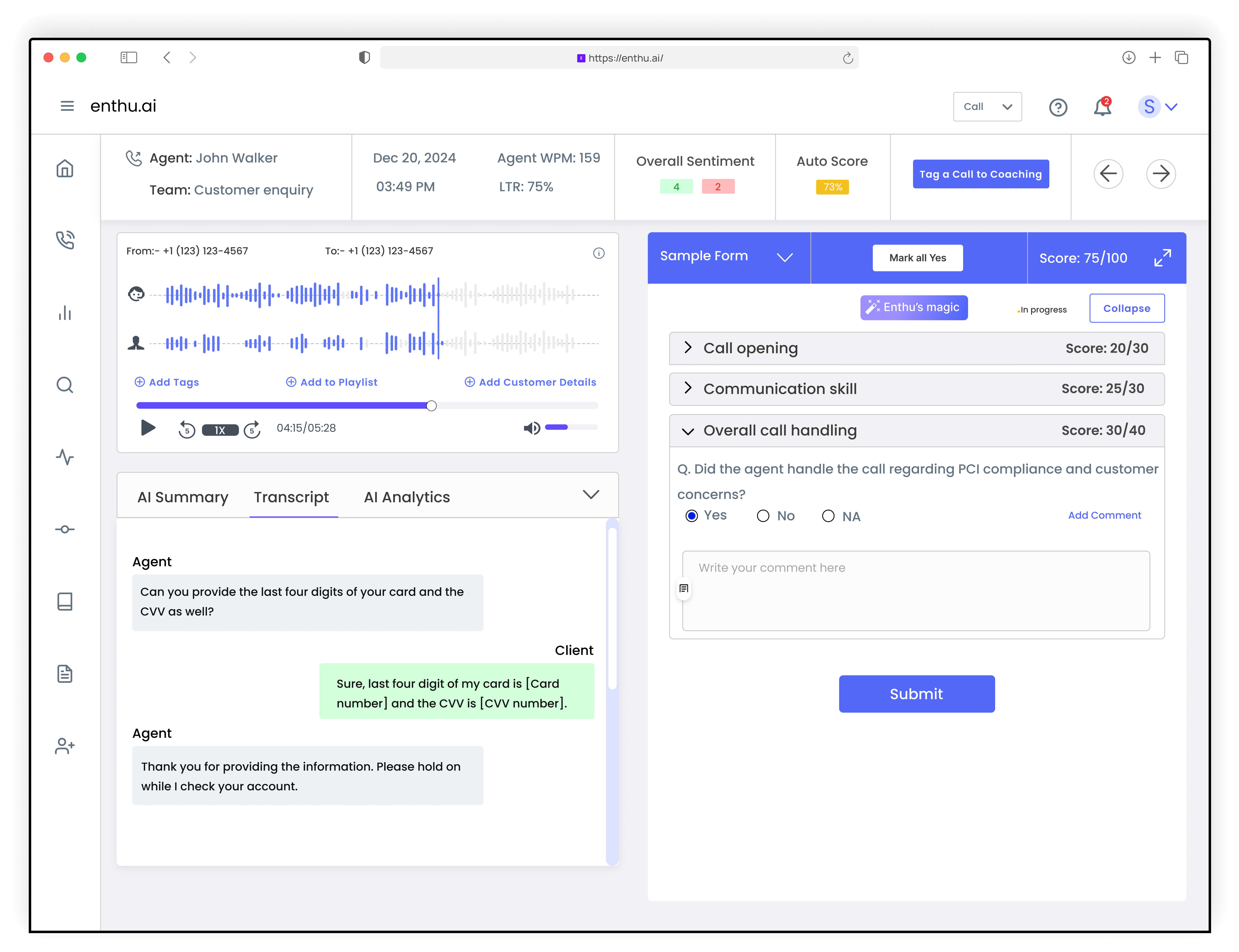
Conclusion
Call center attrition is a critical issue that can have a significant impact on a company’s performance.
High attrition rates can lead to increased costs, reduced customer satisfaction, and lower employee morale.
It is essential for call centers to measure their attrition rates and implement strategies to reduce it.
By addressing employee attrition proactively, companies can create a stable and productive workforce, improve customer experience, and ultimately drive business success.
FAQs
1. How do you manage attrition in a call center?
Some strategies for managing attrition in call centers include providing clear expectations, offering career growth opportunities, recognizing and rewarding good performance, and improving workplace culture.
2. What is the reason for attrition in call center?
Some reasons for attrition in call centers include low job satisfaction, inadequate training, high-stress levels, long working hours, limited growth opportunities, and poor management.
Personal reasons such as family obligations and health issues can also contribute to attrition.
3. What is an acceptable attrition rate in a call center?
An acceptable attrition rate in call centers varies depending on the industry and the location.
Generally, a rate of 10-15% is considered average, while rates above 20% may indicate underlying issues that need to be addressed.
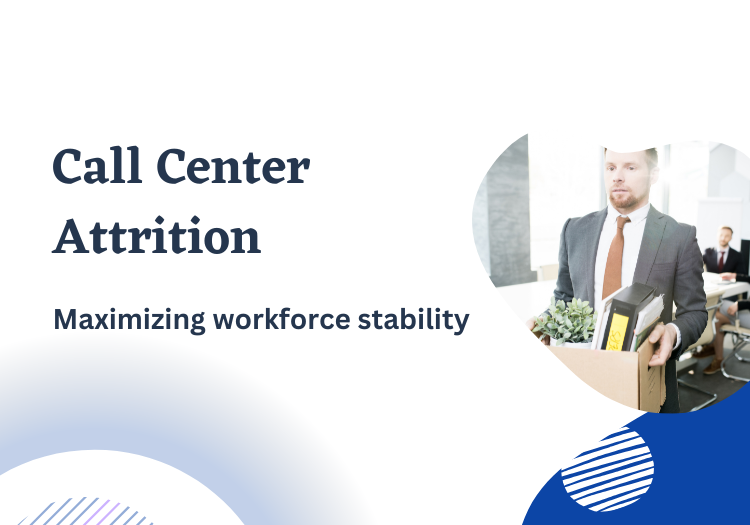



 On this page
On this page
